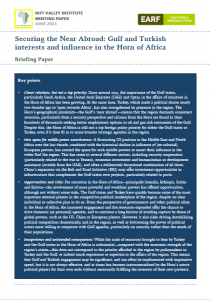Since around 2015, the importance of the Gulf states, particularly Saudi Arabia, the United Arab Emirates (UAE) and Qatar, in the affairs of countries in the Horn of Africa has been growing. At the same time, Turkey, which made a political choice nearly two decades ago to ‘open towards Africa’, has also strengthened its presence in the region. The Horn’s geographical proximity—the Gulf’s ‘near abroad’—means that the region demands consistent attention, particularly from a security perspective and citizens from the Horn are found in their hundreds of thousands seeking better employment options in oil and gas rich economies of the Gulf. Despite this, the Horn of Africa is still not a top foreign policy priority for either the Gulf states or Turkey, even if it does fit in to some broader strategic agendas in the region.
A fluctuating US position in the Middle East and North Africa over the last decade, combined with the historical decline in influence of (ex-colonial) European powers, has created the space for such middle powers to assert their influence in the wider Red Sea region. This has come in several different sectors, including security cooperation (particularly related to the war in Yemen), economic investment and humanitarian or development assistance (notably from the UAE), and often a deliberately formulated combination of all three. China’s expansion via the Belt and Road Initiative (BRI) may offer investment opportunities in infrastructure that complement the Gulf states own projects, particularly related to ports.
For countries in the Horn of Africa—principally Somalia, Ethiopia, Sudan and Eritrea—the involvement of more powerful and wealthier powers has offered opportunities, although not without some risks. The Gulf states and Turkey have quickly become some of the most important external players in the competitive political marketplace of the region, despite no clear individual or collective plan to do so. From the perspective of governments and other political elites in the Horn of Africa, the increased engagement and the resources expended offer the chance to drive domestic (or personal) agendas, and to continue a long history of avoiding capture by those of global powers, such as the US, China or European players. However, it also risks driving destabilizing political competition domestically, and in the region, as well as buttressing the power of political actors most willing to cooperate with Gulf agendas, particularly on security, rather than the needs of their populations.
While the scale of resources brought to bear by Turkey and the Gulf states in the Horn of Africa is substantial—compared with the economic strength of the region’s states—this does not correspond to the priority afforded to the region by policymakers in Turkey and the Gulf, or indeed much experience or expertise in the affairs of the region. This means that Gulf and Turkish engagement may be significant, and can often be implemented with impressive speed, but it is not always effective, and at times has become instrumentalized by the Horn’s astute political players for their own ends without necessarily fulfilling the interests of their new partners.




